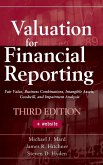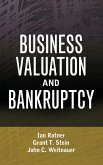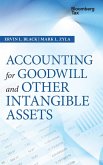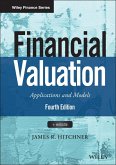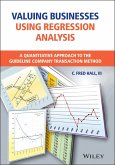The value of a business is essneitally related to three main factors: its current operations, its future prospects and its embedded risk. The recent financial crisis completely reshaped the framework for each of these elements with a major impact on the concept of "value" and on the metrics to measure it. Corporations now do business in a context becoming progressively faster, more diverse and more interconnected so that also valuing their current operations is increasingly more complex. Secondly, forecasting future macro and business related dynamics is getting less standardized in a busines environment characterized by difficult-to-predict changes, both on the upside and on the downside, and by constant innovation. Thirdly, new types of risks and competition, so far unknown, are shaping both the operational and the financial side of enterprises, redfining the importance to manage uncertainty as a key element to achieve success. In this context, "Corporate Valuation" offers investment bankers and equity analysts many new insights. First, the book provides a more modern and thorough analysis of the idea of value. In an environment characterized by an increased complexity where the concept itself of value is challenged, the first part of the book provides a multidisciplinary perspective on valuation, which considers both accounting and financial principles. Second, the book introduce several new models and valuation techniques not featured in main valuation manuals, including the scenario-based valuation, the Montecarlo analysis, the advanced tools to perform relative valuation (eg harmonic mean, adjustments to take into account the leverage degree, structuring of deal multiples...). Finally, an ad hoc chapter will cover valuations in litigation and restructuring settings. The approach will be eminently practical with cases and numerical examples. The book will walk the reader through a map of the valuation approaches to use in the post-financial crisis explaining how to choose the models and how to enhance with advanced tools their accuracy.In particular, the book will specifically describe several sophisticated techniques which explicitly consider the centrality of the risk element, including: Scenario analysisMonte Carlo simulationRisk adjusted valuation multiplesCyclically adjusted valuation multiplesAnalysis and decomposition of deal multiplesValuations for litigation and restructuring purposes
Risk consideration is central to more accurate post-crisis valuation Corporate Valuation presents the most up-to-date tools and techniques for more accurate valuation in a highly volatile, globalized, and risky business environment. This insightful guide takes a multidisciplinary approach, considering both accounting and financial principles, with a practical focus that uses case studies and numerical examples to illustrate major concepts. Readers are walked through a map of the valuation approaches proven most effective post-crisis, with explicit guidance toward implementation and enhancement using advanced tools, while exploring new models, techniques, and perspectives on the new meaning of value. Risk centrality and scenario analysis are major themes among the techniques covered, and the companion website provides relevant spreadsheets, models, and instructor materials. Business is now done in a faster, more diverse, more interconnected environment, making valuation an increasingly more complex endeavor. New types of risks and competition are shaping operations and finance, redefining the importance of managing uncertainty as the key to success. This book brings that perspective to bear in valuation, providing new insight, new models, and practical techniques for the modern finance industry. * Gain a new understanding of the idea of "value," from both accounting and financial perspectives * Learn new valuation models and techniques, including scenario-based valuation, the Monte Carlo analysis, and other advanced tools * Understand valuation multiples as adjusted for risk and cycle, and the decomposition of deal multiples * Examine the approach to valuation for rights issues and hybrid securities, and more Traditional valuation models are inaccurate in that they hinge on the idea of ensured success and only minor adjustments to forecasts. These rules no longer apply, and accurate valuation demands a shift in the paradigm. Corporate Valuation describes that shift, and how it translates to more accurate methods.
Hinweis: Dieser Artikel kann nur an eine deutsche Lieferadresse ausgeliefert werden.
Risk consideration is central to more accurate post-crisis valuation Corporate Valuation presents the most up-to-date tools and techniques for more accurate valuation in a highly volatile, globalized, and risky business environment. This insightful guide takes a multidisciplinary approach, considering both accounting and financial principles, with a practical focus that uses case studies and numerical examples to illustrate major concepts. Readers are walked through a map of the valuation approaches proven most effective post-crisis, with explicit guidance toward implementation and enhancement using advanced tools, while exploring new models, techniques, and perspectives on the new meaning of value. Risk centrality and scenario analysis are major themes among the techniques covered, and the companion website provides relevant spreadsheets, models, and instructor materials. Business is now done in a faster, more diverse, more interconnected environment, making valuation an increasingly more complex endeavor. New types of risks and competition are shaping operations and finance, redefining the importance of managing uncertainty as the key to success. This book brings that perspective to bear in valuation, providing new insight, new models, and practical techniques for the modern finance industry. * Gain a new understanding of the idea of "value," from both accounting and financial perspectives * Learn new valuation models and techniques, including scenario-based valuation, the Monte Carlo analysis, and other advanced tools * Understand valuation multiples as adjusted for risk and cycle, and the decomposition of deal multiples * Examine the approach to valuation for rights issues and hybrid securities, and more Traditional valuation models are inaccurate in that they hinge on the idea of ensured success and only minor adjustments to forecasts. These rules no longer apply, and accurate valuation demands a shift in the paradigm. Corporate Valuation describes that shift, and how it translates to more accurate methods.
Hinweis: Dieser Artikel kann nur an eine deutsche Lieferadresse ausgeliefert werden.


